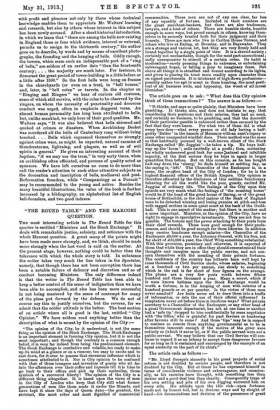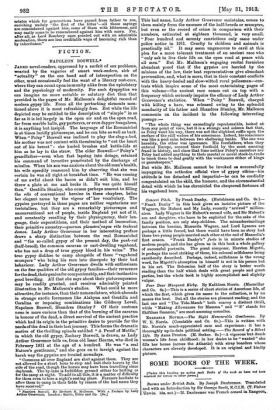"THE ROUND TABLE" AND THE MARCONI QUESTION.
THE most interesting article in The Round Table for this quarter is entitled "Ministers and the Stock Exchange." It
deals with remarkable justice, sobriety, and reticence with the whole Marconi question. A great many of the points might have been made more strongly, and, we think, should be made more strongly when the last word is said on the matter. At the present stage, however, nothing could be better than the
tolerance with which the whole story is told. In substance the writer takes very much the line taken in the Spectator, namely, that though there has not been corruption there has been a notable failure of delicacy and discretion and so of conduct becoming Ministers. The only difference indeed is that the writer in The Round Table has been able to
keep a better control of the sense of indignation than we have been able to accomplish, and also has been more successful in not being mastered by the sense of contempt for many of the pleas put forward by the defence. We do not of course say this to justify ourselves, but the reverse, for we admit that the colder attitude is the better. The best section of an article where all is good is the last, entitled " City Opinion." We have seldom read anything better than the description of what is meant by the opinion of the City :-
"The opinion of the City, be it understood, is not the same thing as the opinion of the Stock Exchange. The Stock Exchange is an important element in forming City opinion, but it is not the most important ; and though the contrary is a common enough belief, it is very far indeed from being the predominant element. The Stock Exchange is combative and volatile, too ready to make up its mind at a glance or on a rumour, too easy to excite and to cast down, for it ever to possess that enormous influence which is sometimes attributed to it. Nor is City opinion to be confused with that of those loungers and inventors of gossip who sit far into the afternoon over their coffee and liqueurs till it is time to go back to their offices and pick up their umbrellas, those symbols of a recovered liberty! The opinion of the City is a different thing altogether. It is based upon the views of men in the City of London who keep that City still what former generations of men like them made it under the Stuarts, and have kept it since the days of Queen Anne—the greatest, the strictest, the most sober and most dignified of commercial communities. These men are not of any one class, far loss of any equality of fortune. Included in their numbers are the great merchant-bankers, but there are also tradesmen, lawyers, and a host of others. There are bumble clerks, bumble enough in some ways, but proud enough in others, knowing them- selves to be securely trusted both for their judgment and their honesty. There are men who live in Carlton House Terrace, and others who live at Ealing, at Bromley, and in Bayswater. They are a strange and various lot, but they are very firmly held and bound together by a single point of view. It is a shrewd society ; certainly not uncharitable, though for the most part unemotional ; sadly unresponsive to stimuli of a certain order. Its habit is moderation—rarely pressing things to extremes, or entertaining extravagant hopes, or falling a prey to imaginary fears. But above all things it is steadfast and honest according to its lights, and given to placing its trust more readily upon character than on signed parchments. It is intolerant of high-flown professions— possibly rather too apt to scent in them humbug, the most pesti- lent of all business evils, and hypocrisy, the worst of all moral blemishes."
The article goes on to ask : " What does this City opinion think of these transactions ?" The answer is as follows :-
" It thinks, and says so quite plainly, that Ministers have been gambling. It thinks also, and does not hesitate to say, that considering their positions and their salaries, they had no need, and certainly no business, to be gambling, and that the discredit of their particular gamble is enhanced rather than excused by the fact that they were losers. For what two of them did is what every tyro does—what every parson or old lady having a half- guilty 'flutter' in the haunts of Mammon with an aunt's legacy or some other unexpected windfall does. Their method was the same as that habitually pursued by a well-known client of the Stock Exchange called 'Mr. Juggins '—he takes a tip. He buys half- way up the 'boom '; sells excitedly at a profit; then, mistaking his wholly undeserved good luck for some natural and infallible sagacity, at the first serious drop he buys in again in larger quantities than before. But on this occasion, as he has bought half-way down the 'slump,' he finds himself at settling day, as the saying is, 'left.' The Chancellor of the Exchequer is, in a sense, the er-officio head of the City of London ; for he is the highest financial officer of the British Empire. City opinion is therefore affronted by the disclosure of this sublime functionary behaving for all the world like the poor, greedy, excited Mr. Juggins of ordinary life. The feelings of the City upon this episode are very much what the feelings of 'the counting house' would be if the head of the great house of Baring, or of the great house of Rothschild, or the chief cashier of the Bank of England were to be detected winning and losing pennies at pitch-and-toss with ragged urchins in some quiet court at the back of the Guild- hall. This is one aspect of the matter ; but there is another and a more important. Ministers, in the opinion of the City, have no right to engage in speculative investments. They are not free to gamble. The honour and the power attaching to their posts form their chief rewards. These were good enough for their prede- cessors, and should be good enough for them likewise. In addition they receive handsome enough salaries—the Chancellor of the Exchequer £5,000 a year, the Attorney-General, with his fees, not far short of £15,000 a year, the Chief Whip something substantial. With this provision, pecuniary and otherwise, it is expected of them that while they are in office they should concentrate all their thoughts and energies upon the public service, and not con- cern themselves with the mending of their private fortunes. The confidence of the country has hitherto been well kept by some thousands of Civil Service clerks, whose salaries, beginning at a hundred or two per annum, rise slowly to something which in the end is far short of four figures on the average. The plums are a very few posts worth between fifteen hundred and three thousand a year. Many a secret, which if it were known betimes upon the Stock Exchange would be worth a fortune, is in the keeping of men with salaries of a hundred pounds or so per quarter. Is the virtue of these men never assailed? Are baits never set to draw them into a traffic of information, or into the use of their official influence? Is temptation never set before them in insidious ways ? What private secretary to a Chancellor of the Exchequer, or any other head of a great Government department, has not at one time or another had a 'safe tip' dropped to him confidentially by some negotiator with the Office,' who is grateful for past favours or hankering after favours still to come ? And these 'tips' may be in respect to matters so remote from anything governmental as to be in themselves innocent enough if the motive of the giver were entirely so (which it never is), or if the public servant were not a public servant. We may believe that our Civil Service will con- tinue to regard it as an infamy to accept these dangerous favours for so long as it is sustained and encouraged by the example of an equal austerity on the part of its chiefs."
The article ends as follows :-
"Mr. Lloyd George's sincerity in his great projects of social reform is not doubted by serious people, and therefore is not doubted by the City. But at times he has expressed himself in terms of considerable violence and extravagance, and occasion- ally, as his enemies have thought, with something less than justice and a good deal less than charity. Consequently traps of his own setting and pits of his own digging surround him on every side. His attacks upon the idle rich—upon fortunes made not by honest toil, but in devious ways and by sleight of band—his denunciations and derision of the possessors of great
estates which for generations have passed from father to son, enriching unduly the first of the litter'—all these sayings are remembered against him, some of them with bitterness, and may easily come to be remembered against him with scorn. For, after all, as Lord Rosebery once pointed out with an admirable moderation, there are less creditable ways of becoming rich than by inheritance."



















































 Previous page
Previous page